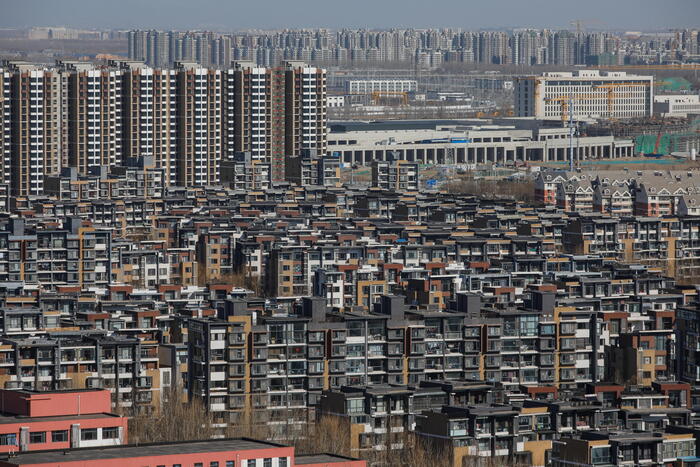US President Joe Biden wants to release oil reserves in an international campaign.
That should stop the price spiral.
Other countries want to follow suit - possibly China too.
Beijing / Munich - Suddenly it's fast. Several large states want to tap into their strategic oil reserves because of the current energy crisis. The USA is in the process of opening the oil taps: around 50 million barrels are to flow from the reserves in the next few months. India, Japan and Great Britain have also announced that their reserves will be opened. Now the world is looking at China *. A specific announcement is expected from Beijing these days. The US government had spoken of an internationally coordinated release action.
Because a few weeks ago the hope was dashed that the oil production club of the OPEC countries would significantly increase crude oil production in order to counteract the rapidly rising raw material prices. So far, the 23 producing countries of the Opec + oil network have only expanded their production at a moderate pace. They are not interested in flooding the market, because then prices fall and with them their revenues. So the focus of many countries is now on their emergency reserves, because they are there for precisely these situations. US President Joe Biden * is struggling with high inflation at home, to which rising oil prices are a major contributor. At his video summit with China's head of state Xi Jinping, Biden asked the People's Republic to also tap into its oil reserves in view of rising oil prices *.
China then showed itself to be open, but initially did not give a clear commitment.
A week ago, the Beijing State Reserves Bureau announced that it was working on releasing crude oil reserves.
However, the authority did not comment on the US request.
China and the US: Geopolitics and Oil Reserves
As with climate protection, geopolitics also play a role when it comes to oil reserves. Beijing's argument: The US has no right to demand cooperation from China if they are trying to contain it at the same time. “China may do the US a favor by opening its crude oil reserves,” writes the state newspaper
Global Times
. In view of the mixed relationship with Washington, however, one will “prioritize one's own interests”. It was only on Tuesday that the US demonstratively invited Taiwan to Biden's virtual summit of democracies *. Due to its system, China is of course left out. But the invitation from Taiwan, regarded by Beijing as a breakaway province, is an affront in the eyes of the government.
China, meanwhile, is well aware that Biden is under great domestic political pressure because of inflation at home - a pressure that Beijing has not felt to the same extent so far.
The current crude oil price of around US $ 80 per barrel does not require the immediate release of strategic reserves by China, the Hong Kong
South China Morning Post
quoted
energy expert Wang Yongzhong from the Chinese Academy of Social Sciences.
Wang admits, however, that both the US and China, as bulk consumers, have an interest in lowering the price.
China: building strategic oil reserves since 2007
The US has the world's largest reported strategic oil reserves at 727 million barrels. China began storing its own oil reserves in 2007. Beijing does not publish the amount of reserves on a regular basis: The latest figure from the National Statistics Office is from 2017. At that time, China held a total of around 280 million barrels at seven locations. However, experts assume that the People's Republic stored a large additional amount, especially in March and April 2020. Back then, oil prices were rocketing because of the start of the corona pandemic.
Oil security has been of great strategic importance to China for decades.
The People's Republic is by far the largest oil importer in the world, as it has only small deposits of its own.
In 2020 it imported almost three quarters of the oil it consumed.
Wang Yongzhong estimates that China's crude oil reserves are currently roughly equivalent to 40-50 days' import.
The International Energy Agency recommends reserves equal to the net imports of at least 90 days.
But in case of doubt, China can also fall back on the stocks of its three oil companies such as Sinopec and Petrochina, all of which are majority-owned by the state.
China: Currently there is less demand for crude oil
However, it is uncertain whether China will be able to sell large amounts of released oil reserves in the country at all. In September Beijing had already announced that it would sell parts of the reserves to refineries through auctions. But only one of these auctions took place at all, with moderate interest. In the event of a renewed auction of oil reserves, refiners might have little interest in bidding, the analysts at S&P Global Platts cite sources in China's oil sector. "Because domestic demand is falling in view of the pandemic-related restrictions ahead of the Winter Olympics."
Indeed, Beijing is expected to curtail refining activities, especially in northern China, in order to cap emissions in the lead-up to the Beijing Winter Olympics in February 2022.
The ongoing zero-covid policy * with its numerous restrictions also severely restricts mobility.
And that lowers the demand for fuels for the transport sector.
This trend is confirmed by this year's import data: Between January and October, China's oil imports were 7.2 percent lower than in the same period of the previous year.
So that China can help the US at all, even with good will, is not a matter of fact.
(
ck) * Merkur.de is an offer from IPPEN.MEDIA.







